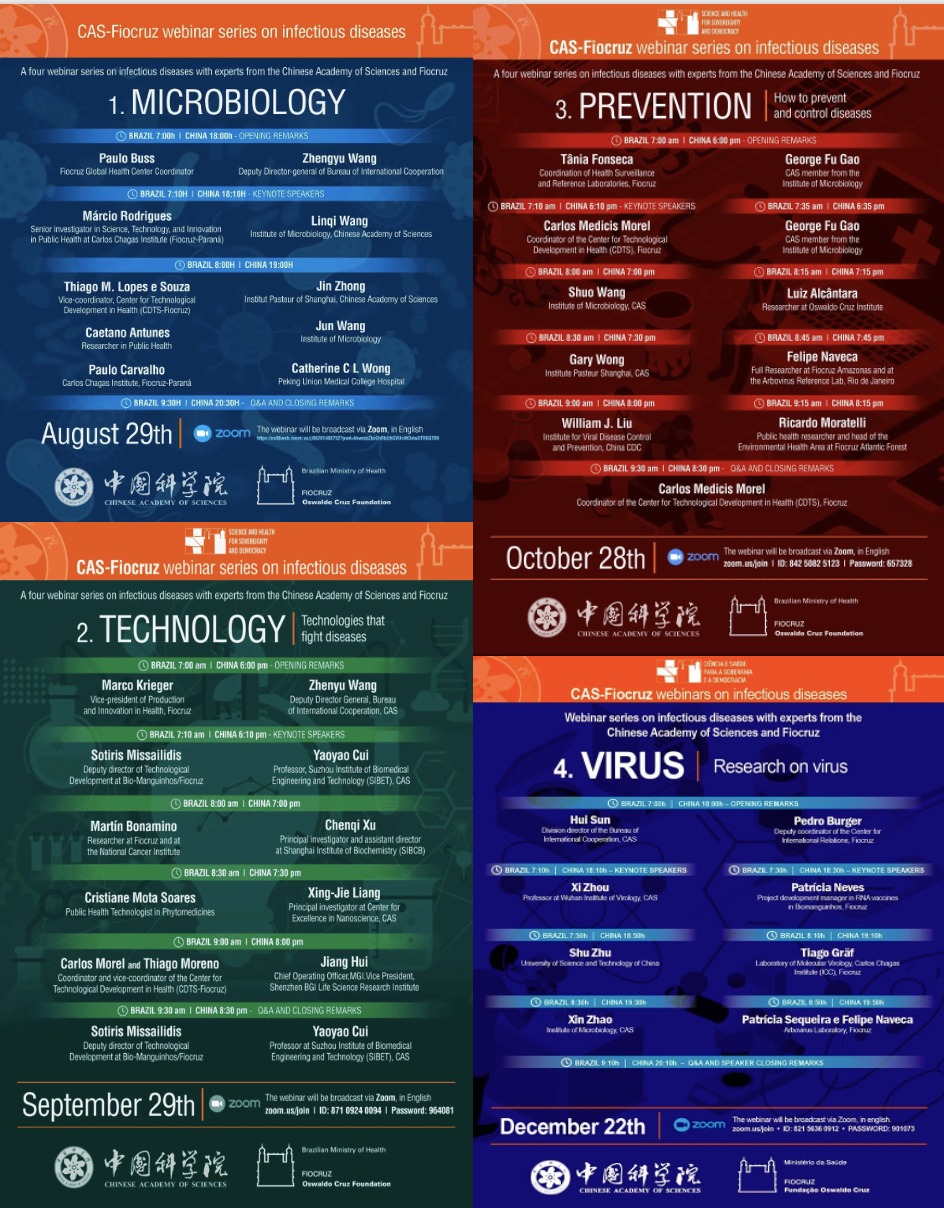Chinese Academy of Sciences and Fiocruz conclude webinars on infectious diseases
28/12/2022
Ana Paula Blower (Fiocruz News Agency)
 After four webinars, the series of virtual meetings between the Chinese Academy of Sciences (CAS) and Fiocruz in 2022 came to an end this Thursday (12/22). In the last months, scientists from both institutions have met to exchange knowledge and debate infectious diseases, deepening themselves into the topics "Microbiology", "Prevention", "Technology" and “Viruses”. The meetings, a result of a mutual effort to promote scientific collaboration, improve mutual understanding and strengthen national capacity in health, established the partnership between the Foundation and CAS and opened doors for future cooperation.
After four webinars, the series of virtual meetings between the Chinese Academy of Sciences (CAS) and Fiocruz in 2022 came to an end this Thursday (12/22). In the last months, scientists from both institutions have met to exchange knowledge and debate infectious diseases, deepening themselves into the topics "Microbiology", "Prevention", "Technology" and “Viruses”. The meetings, a result of a mutual effort to promote scientific collaboration, improve mutual understanding and strengthen national capacity in health, established the partnership between the Foundation and CAS and opened doors for future cooperation.
About 40 Brazilian and Chinese scientists, researchers from Fiocruz and CAS, made presentations throughout the four webinars. At the end of the presentations, question and answer sessions were held to deepen the knowledge exchange. In the presentations, they dealt with topics such as pathogens, and ways of controlling and preventing them. The meetings were broadcasted via Zoom, in English.
The webinars had their first edition in December 2021, with the participation of the president of Fiocruz, Nísia Trindade Lima, and the vice president of CAS, Zhang Yaping, in the opening. On the occasion, Nísia highlighted that the meetings were a way of implementing the memorandum signed with CAS in 2018. In that year, she and Zhang Yaping signed a Memorandum of Understanding (MoU) at Fiocruz’s headquarters, the third one signed between the Foundation and the Chinese institutions at the time. The MoU forecasts the exchange of scientists and data, as well as the joint development of research projects, scientific events and articles.
Window of opportunities
To the vice president of Production and Innovation in Health (VPPIS/Fiocruz), Marco Krieger, the meetings were a way of establishing the partnership between CAS and Fiocruz, and a window of opportunities for future collaborations. He explains that discussions with China were already in progress for about four years on issues that have proven to be of the most importance, such as health surveillance. Before that, Krieger mentions an initiative already in discussion for the implementation of a surveillance center between Fiocruz, CAS and China CDC to exchange experiences.
“During the pandemic, we had important exchanges with CAS, Chinese institutions and companies. And the seminars were an opportunity to establish a privileged channel with CAS in areas where Fiocruz also has prominence”, Krieger points out. “Even with the logistics difficulties imposed by the pandemic, we were able to keep the interactions and be open to future opportunities in this field, especially for infectious diseases”.
He adds that, at a favorable sanitary moment, he expects to bring back the physical visit and the idea of establishing the joint center in the field of epidemiological surveillance and input development, both in Brazil and China, in a coordinated manner. “This way we could have more directed missions, higher capacity to identify potential areas in common that can be the object of this joint initiative," he explained.


